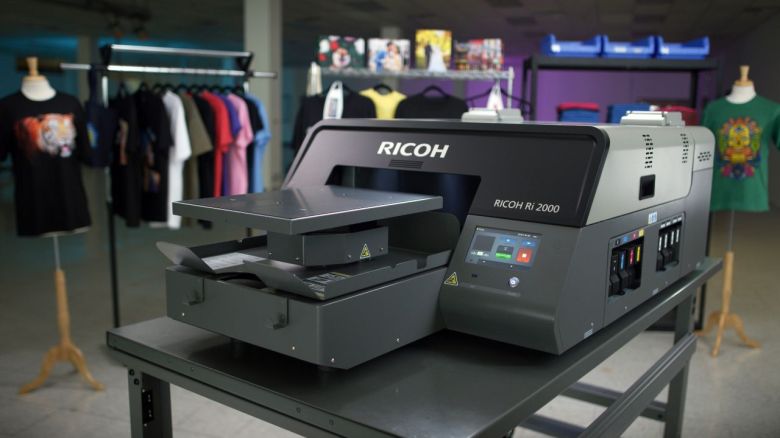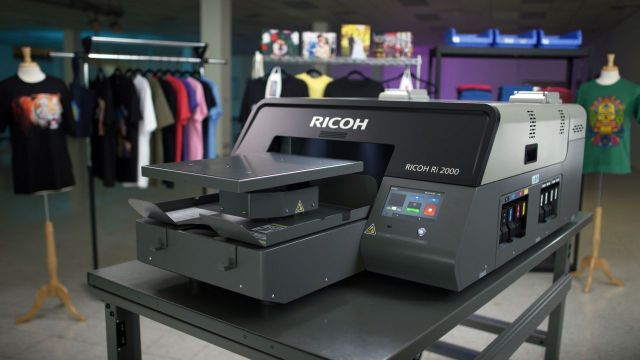
This is an extract about Ricoh Australia from the Textile Printing Technology Focus which was published in the June 2022 issue of ProPrint. To read the full story click here.
Ricoh is one of the world’s largest suppliers of print heads and ink technology to print equipment manufacturers and produces a range of digital printing solutions for direct-to-garment (DTG), direct-to-fabric (DTF) and wide format soft signage applications.
Henryk Kraszewski, senior product and marketing manager, production print, at Ricoh Australia, says digital textile printing is a key solution for helping the fashion industry find a more sustainable production pathway.
“The apparel industry is responsible for emitting ten per cent of the world’s carbon emissions. It’s also the second largest consumer of the planet’s water supply and it is the world’s second largest polluter behind the petroleum industry,” Kraszewski said.
“The United Nations Economic Commission for Europe estimates that up to 85 per cent of textiles go to landfill every year. By 2030, the projection is that we will be discarding a staggering 134 million tonnes of textiles a year.
“With climate change an undeniable threat to the future of our planet, the move to a circular economy for the textile industry is critical. The fashion industry needs to find more sustainable manufacturing processes.”
Kraszewski says DTF and DTG printing is one way to achieve this as this process enables on-demand manufacture of just what is needed or a limited inventory.
“During COVID-19 the volume of fabric digitally printed almost doubled, yet it remains only a very small percentage of colouring textiles,” he added.
Kraszewski says the onset of fast fashion is a challenge to the sector’s environmental sustainability.
“The fast fashion quick-turn model runs counter to the need for the fashion industry to build a sustainable model for the future. Fast fashion is all about quick turnarounds and short sales cycles, yet the need to continually release new products means that today’s trend is tomorrow’s waste,” he said.
“The need to protect brand value has led many fast fashion suppliers to send dead stock to landfill or even incinerate it – without ever reaching a consumer.”
Moving to an on-demand production model is part of the solution, Kraszewski said.
“Just like digital print has changed the nature of the print industry with its ability to print what’s required, when it’s required and close to the point of consumption, the made-to-order model for the fashion industry represents a far more ethical and sustainable approach as it limits overproduction and reduces the risk of unwanted excess stock going to landfill.”
Kraszewski says DTG printing offers three key advantages for these issues.

First up is its ability to print on a much broader array of substrates, including 100 per cent cotton, high-cotton blends, polyester, canvas, hemp, and linen. Secondly, DTG supports white ink, enabling printing on black or dark fabrics. And thirdly, DTG utilises water-based pigments that are environmentally friendly and non-toxic. Unlike dye-sublimation that typically use solvent-based inks, DTG emits no fumes and no VOCs.
He notes that recently the Ricoh Ri 1000 and Ri 2000 DTG printers have added the ability to provide Direct to Film (DTF) printing. DTF involves printing a design onto a special film, applying, and melting a powder adhesive to the printed film, and pressing the design onto the garment or merchandise. No other special equipment is required for a print provider that already uses DTG printing.
“The Ricoh Ri 1000 is an ideal solution for new businesses, print providers looking to expand their offerings, and e-commerce businesses with mid-volume production. With fast speeds, high image quality, more accurate colours, and automated setup and maintenance, it has been designed to outperform its competition,” he said.
The Ri 2000 delivers exceptionally fast print speeds, simplified maintenance,
and convenient ease of use.
“It enables print providers to spend less time setting up prints and more time on growing their business. With a robust full feature set designed for the power user, it delivers superior value in its price class,” he said.
Ricoh also offers the Ri 100 – a compact and affordable DTG option which fits on a shopfront counter – as well as the Ricoh Pro L5160 wide format printer which can print on self-adhesive PVC, wallpaper, and soft signage.
“The Ri 100 is small enough to operate on a shopfront counter, enabling production of customised T-shirts, bags, pillowcases and other products as customers wait,” Kraszewski said.
“The Pro L5160 is a highly productive wide format with strong environmental credentials, producing high quality print on a diverse array of permeable and impermeable material. It utilises a water-based aqueous resin ink and is the first printer in its class to feature white ink.”
For more information, visit Ricoh Australia.
Comment below to have your say on this story.
If you have a news story or tip-off, get in touch at editorial@sprinter.com.au.
Sign up to the Sprinter newsletter
